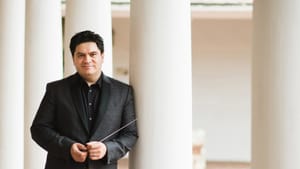Stay in the Loop
BSR publishes on a weekly schedule, with an email newsletter every Wednesday and Thursday morning. There’s no paywall, and subscribing is always free.
Meh 'Messiah'
Philadelphia Orchestra presents Handel's 'Messiah'

Philadelphia Orchestra continues its decades-long holiday tradition of presenting George Frideric Handel’s 1741 oratorio Messiah. This season’s offering boasted a quartet of international soloists under the baton of conductor-in-residence Cristian Măcelaru. Unfortunately, the performance was a perfunctory affair.
Messiah has always been hard to categorize. At many points, it nearly rises to the level of opera in its telling of humanity’s redemption through the birth, death, and resurrection of Jesus Christ. But despite its dramatic scope and length — nearly three hours, even after the standard cuts — Handel scored the work for a small Baroque orchestra, which is how the Philadelphians continue to present it.
Mixed success
The disparity between the oratorio’s mighty themes and elegant, contained musical virtues are best appreciated in an intimate venue. The most distinctive local performance I've seen remains Tempesta di Mare’s 2013 staging, which employed period instrumentation and was presented without a conductor. Not all Assumptions can rely on such idiosyncrasies to distinguish themselves, and Verizon Hall, the orchestra’s home venue, is more than twice the size of the University of Pennsylvania’s Irvine Auditorium, where Tempesta performed.
But excellent performances have a way of drawing the audience in, no matter their distance from the stage. The greatest pleasure came from the exceptional Philadelphia Symphonic Choir, under the fine leadership of Joe Miller. Although small — I counted fewer than 50 choristers on stage — they made a massive sound, intoning the various proclamations of joy and fear that Handel assigned them. By the time they reached the popular “Hallelujah” chorus, which closes the oratorio’s second of three parts, I was content to join the rest of the audience who stood and cheered them.
Few other elements reached the chorus’s high level. Măcelaru’s ragged, shapeless approach on the podium never allowed the music and narrative to coalesce. Each moment existed in its own orbit, which made for a long, sluggish evening. Interminable pauses between movements only accentuated the performance’s disjointedness. Although the orchestra’s string-heavy playing often sounded beautiful, Măcelaru offered little insight into the composer’s esoteric choices.
Hark, the herald angels sing
Of the four soloists, Russian soprano Ekaterina Siurina distinguished herself by her lovely tone and agile coloratura. She easily dispatched the melismatic demands of “Rejoice greatly, O daughter of Zion,” and offered a genuinely moving account of “How beautiful are the feet of Him.” But Siurina’s heavily accented English diction often rendered the text unintelligible, particularly in the long and difficult aria “I know that my Redeemer liveth.”
British baritone Mark Stone sounded appropriately stentorian in “The trumpet shall sound,” blending beautifully with David Bilger’s triumphant trumpeting. But elsewhere he seemed unable to fulfill his part’s more florid requirements.
Stone sang better than Nicholas Phan, whose thin, reedy tenor noticeably cracked during “Comfort ye my people.” Phan never quite recovered from this early misstep, although he sang with passion and a clear understanding of the sacred text.
U.S. mezzo-soprano Jamie Barton, who made her orchestra debut with these performances, was perhaps the concert’s biggest draw. She came to Philadelphia direct from her recital debut at Carnegie Hall and after concluding a run of Norma at the Metropolitan Opera.
It’s easy to imagine this peripatetic schedule was the cause of her underwhelming performance. Although her vocal production held the suggestion of a first-rate instrument, she sounded under-rehearsed and tired. Only her interpretation of “He was despised,” the oratorio’s longest and most intricate aria, rose to a truly distinguished level.
These performances of Messiah highlight the unfortunate danger of frequently presenting the same work: namely, it can start to feel like old hat. But that repetition also allows for the hope of redemption — appropriate, given the composition in question. Better luck next year.
What, When, Where
Messiah. By George Frideric Handel and Charles Jennens. Ekaterina Siurina, soprano; Jamie Barton, mezzo-soprano; Nicholas Phan, tenor; Mark Stone, baritone; Cristian Măcelaru, conductor. Philadelphia Orchestra. December 21-22, 2017, at the Kimmel Center’s Verizon Hall, 300 S. Broad Street, Philadelphia. (215) 893-1999 or philorch.org.
Sign up for our newsletter
All of the week's new articles, all in one place. Sign up for the free weekly BSR newsletters, and don't miss a conversation.

 Cameron Kelsall
Cameron Kelsall